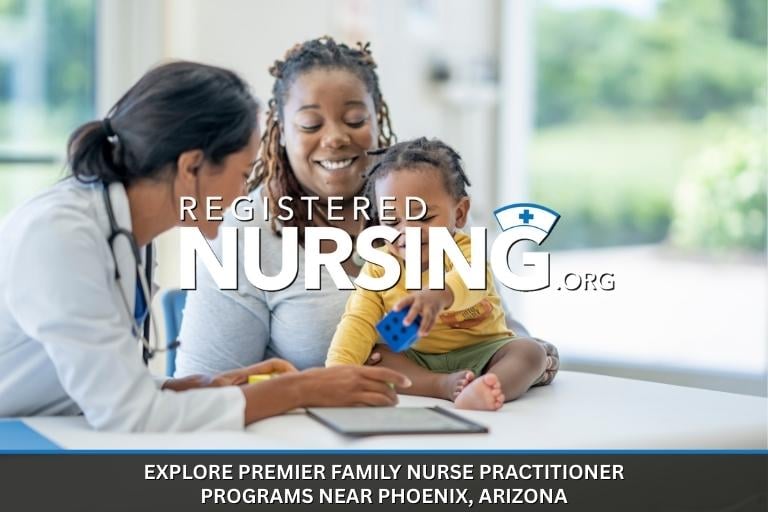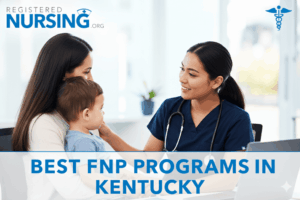Explore Premier Family Nurse Practitioner Programs Near Phoenix, Arizona
- 2026 Premier Family Nurse Practitioner Programs Phoenix, Arizona
- Phoenix's Population Growth and the Rising Demand for FNPs
- Academic Pathways and Program Formats
- Admission Expectations for Phoenix FNP Programs
- Tuition Costs and Ways to Offset Expenses
- Clinical Experience Across Phoenix
- Career Pathways for Phoenix FNP Graduates
- Why Phoenix is Positioned for FNP Success
- Sources
- Latest Articles & Guides

Phoenix is one of the fastest growing metropolitan areas in the United States, with Maricopa County ranking as the nation's top county for population growth in recent years. This rapid expansion has created a greater demand for healthcare providers at every level. Family Nurse Practitioners (FNPs) are playing an increasingly important role by delivering comprehensive primary care to individuals and families across the city. For registered nurses who are ready to take the next step, premier FNP programs in Phoenix provide a structured pathway toward clinical independence, leadership roles, and expanded career opportunities.
According to the Bureau of Labor Statistics, employment of nurse practitioners is projected to grow 45 percent from 2022 to 2032, a rate far higher than the national average for all occupations. This surge is especially relevant in Arizona, where primary care shortages continue to challenge the state's ability to serve both urban and rural communities. Phoenix FNP programs are designed to bridge these gaps by preparing advanced practice nurses who can deliver evidence-based care in diverse healthcare settings.
2026 Premier Family Nurse Practitioner Programs Phoenix, Arizona
Arizona State University Online
Scottsdale, AZ - Public 4-Year - asu.edu
BSN to DNP - Advanced Nursing Practice (Family Nurse Practitioner), DNP
Online & Campus Based - Visit Website
The Digital Immersion DNP in Family Nurse Practitioner at Arizona State University features a hybrid format with online learning and campus visits, offering flexibility and hands-on experience. Students engage in interprofessional learning and simulation labs, with clinical placements adapted to their location. This program readies nurses for certification, highlighting rural health and multicultural populations, and does not mandate an entrance exam for admission.
- Hybrid-online format
- State-of-the-art simulation labs
- Interprofessional learning opportunities
- National certification eligibility
- Tailored clinical experiences
- Focus on rural health
- Multicultural population care
- Flexible campus visits
- Admission requires nursing degree
- Cost varies by residency
Arizona State University
Tempe, AZ - Public 4-Year - asu.edu
MSN to DNP - Advanced Nursing Practice (Family Nurse Practitioner), DNP
Online & Campus Based - Visit Website
Arizona State University's Doctor of Nursing Practice (DNP) in Family Nurse Practitioner is a hybrid program that combines online coursework with periodic campus immersions, designed for working nurses. It utilizes state-of-the-art simulation facilities and offers flexible clinical placement options to prepare students for national certification. This advanced practice program does not require an entrance exam, focusing on delivering high-quality, patient-centered care through a blend of technology and hands-on clinical experiences.
- Hybrid-online program format
- State-of-art simulation facilities
- National certification eligibility
- Flexible clinical placement options
- Advanced nursing practice focus
Phoenix's Population Growth and the Rising Demand for FNPs
The dramatic population growth in Phoenix is driven by migration, economic opportunity, and higher birth rates. These factors create sustained demand for accessible healthcare services. FNPs are often the first providers families encounter, offering preventive care, chronic disease management, and health counseling. In Phoenix, this often means engaging with culturally diverse communities, including significant Hispanic and Native American populations, where culturally responsive care is essential.
Community clinics and public health organizations throughout the city report ongoing shortages of primary care providers. By enrolling in local FNP programs, nurses can position themselves to meet these needs directly, improving access to care in both central Phoenix and the rapidly expanding suburbs. Reports from the Health Resources & Services Administration show that Arizona contains multiple health professional shortage areas, making the role of FNPs critical for meeting public health goals.
Academic Pathways and Program Formats
FNP programs in Phoenix vary in structure, but most are offered through master's, doctoral, or post-master's certificate options. The format allows students to match their educational path with professional goals and personal schedules. Common features include:
- Advanced Curriculum: Coursework typically includes pharmacology, pathophysiology, advanced health assessment, and family primary care.
- Program Duration: Full-time students may finish in two years, while part-time students may take up to four years depending on course load.
- Clinical Hours: Supervised practicum hours are completed in Phoenix hospitals, outpatient centers, and primary care practices.
Example of Program Duration and Clinical Commitment
| Program Track | Typical Length | Clinical Hours Requirement |
| Master's Level | 2–3 years | 600–700 hours |
| Doctoral Level | 3–4 years | 1,000+ hours |
| Post-Master's Certificate | 1–2 years | 500–600 hours |
This blend of academic and clinical immersion ensures graduates are prepared for national certification exams and Arizona state licensure as FNPs. The National Organization of Nurse Practitioner Faculties supports competency standards that guide many of these educational requirements.
Admission Expectations for Phoenix FNP Programs
Admission criteria ensure that applicants are ready for advanced level training. While requirements vary, prospective students can expect to provide:
- A current RN license valid in Arizona
- A bachelor's degree in nursing or equivalent
- Completion of prerequisites in statistics, research methods, and advanced sciences
- A minimum GPA of 3.0 or higher
Additional materials such as professional resumes, statements of intent, and recommendation letters are typically required. Nurses with prior clinical experience in Phoenix healthcare settings can highlight this to strengthen their applications. The Arizona State Board of Nursing provides valuable guidance on licensure and regulatory expectations.
Tuition Costs and Ways to Offset Expenses
Tuition costs for nursing schools in Phoenix depend on program type and length, but the financial investment can be significant. Students often rely on a combination of support strategies to manage costs:
- Employer Assistance: Healthcare organizations in Phoenix may provide tuition support to help employees advance.
- Federal and State Aid: Eligible students may apply for FAFSA funding and Arizona scholarships.
- Loan Forgiveness: Those who serve in rural or medically underserved areas of Arizona may qualify for state or federal loan repayment programs.
Balancing tuition costs with long-term career outcomes is important. Nurse practitioners in Arizona earn above average salaries, making FNP education a strong investment for career advancement. Data from the American Association of Nurse Practitioners also notes that FNPs across the United States are increasingly filling primary care gaps, particularly in regions facing workforce shortages.
Clinical Experience Across Phoenix
Hands-on training is a cornerstone of every FNP program, and the Phoenix metropolitan area offers a wide array of clinical environments that prepare future nurse practitioners for real-world practice. Students gain experience with diverse patient populations while working across urban, suburban, and medically underserved communities.
Urban Hospitals
Students may complete rotations at high-volume, high-acuity medical centers such as Banner – University Medical Center Phoenix, St. Joseph's Hospital and Medical Center (Dignity Health), or Valleywise Health Medical Center. These facilities expose trainees to complex cases, trauma care, and multidisciplinary teams within Phoenix’s central urban core.
Community Health Clinics
FNP students often serve in Federally Qualified Health Centers (FQHCs) and nonprofit clinics located in south and west Phoenix, areas known for healthcare workforce shortages and higher uninsured rates. Sites like Mountain Park Health Center, Adelante Healthcare, and Native Health Phoenix provide primary and preventive care to underserved populations, including Spanish-speaking patients, Indigenous communities, and recent immigrants.
Primary Care Practices
Suburban neighborhoods throughout Maricopa County, including Mesa, Chandler, Glendale, and Peoria, offer opportunities to work in family medicine clinics, pediatric offices, and urgent care centers. These settings allow students to develop long-term patient care relationships and manage a full spectrum of lifespan health needs, from newborn care to geriatric wellness.
Region-Specific Considerations
Phoenix's rapidly growing population, extreme desert climate, and diverse demographics create unique training opportunities and public health priorities for FNP students. Common population health concerns in the region include:
- Chronic conditions such as diabetes, asthma, and cardiovascular disease
- Heat-related illness, particularly among the unhoused population during summer months
- Maternal health disparities among low-income and minority populations
- Behavioral health and substance use disorders, particularly in post-pandemic recovery
In addition, many students engage with telehealth platforms and mobile health units, which are increasingly used across Arizona's rural and underserved communities.
Career Pathways for Phoenix FNP Graduates
Graduates of Phoenix FNP programs enter a job market with abundant opportunities. Common career pathways include:
- Family Practice Provider: Offering primary care in clinics and private practices
- Community Health Nurse Practitioner: Addressing preventive and chronic health needs in underserved neighborhoods
- School or University Health Nurse Practitioner: Supporting student health in educational settings
- Specialty Roles: Collaborating with physicians in pediatrics, geriatrics, or women's health practices
The American Association of Nurse Practitioners highlights the expanding scope of FNP practice nationwide, with growing opportunities in both urban and rural regions. Arizona's workforce trends mirror this expansion, making Phoenix an excellent location for nurse practitioners seeking career growth.
Why Phoenix is Positioned for FNP Success
Phoenix's unique healthcare landscape, shaped by rapid growth and provider shortages, makes it a strong environment for advancing into family nurse practice. Graduates of nurse practitioner programs in Arizona are not only filling urgent healthcare gaps but also contributing to long-term improvements in access and quality of care. The cultural richness of the region provides further opportunities for nurses to practice inclusive, community care.
As Phoenix continues to evolve, family nurse practitioners will be vital to shaping its healthcare system. By pursuing FNP education in Phoenix, nurses gain the tools to provide patient-centered care, advance their careers, and build a resilient healthcare future for Arizona.
Sources
- Bureau of Labor Statistics: Nurse Practitioners
- Health Resources & Services Administration
- National Organization of Nurse Practitioner Faculties
- Arizona State Board of Nursing
- American Association of Nurse Practitioners (AANP)
Latest Articles & Guides
One of the keys to success as a registered nurse is embracing lifelong learning. Our articles and guides address hot topics and current events in nursing, from education to career mobility and beyond. No matter where you are on your nursing journey, there’s an article to help you build your knowledge base.
Browse our latest articles, curated specifically for modern nurses.



